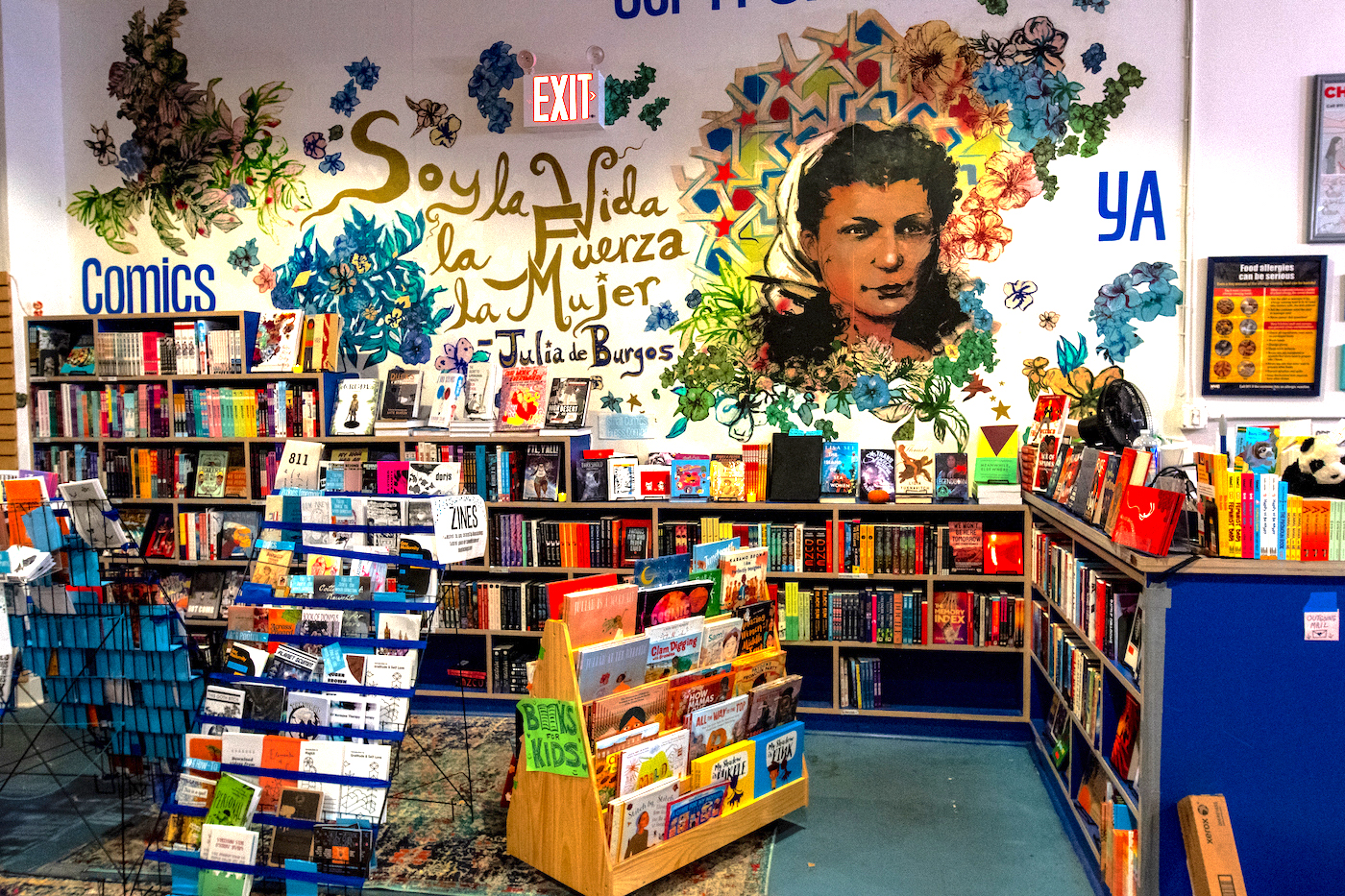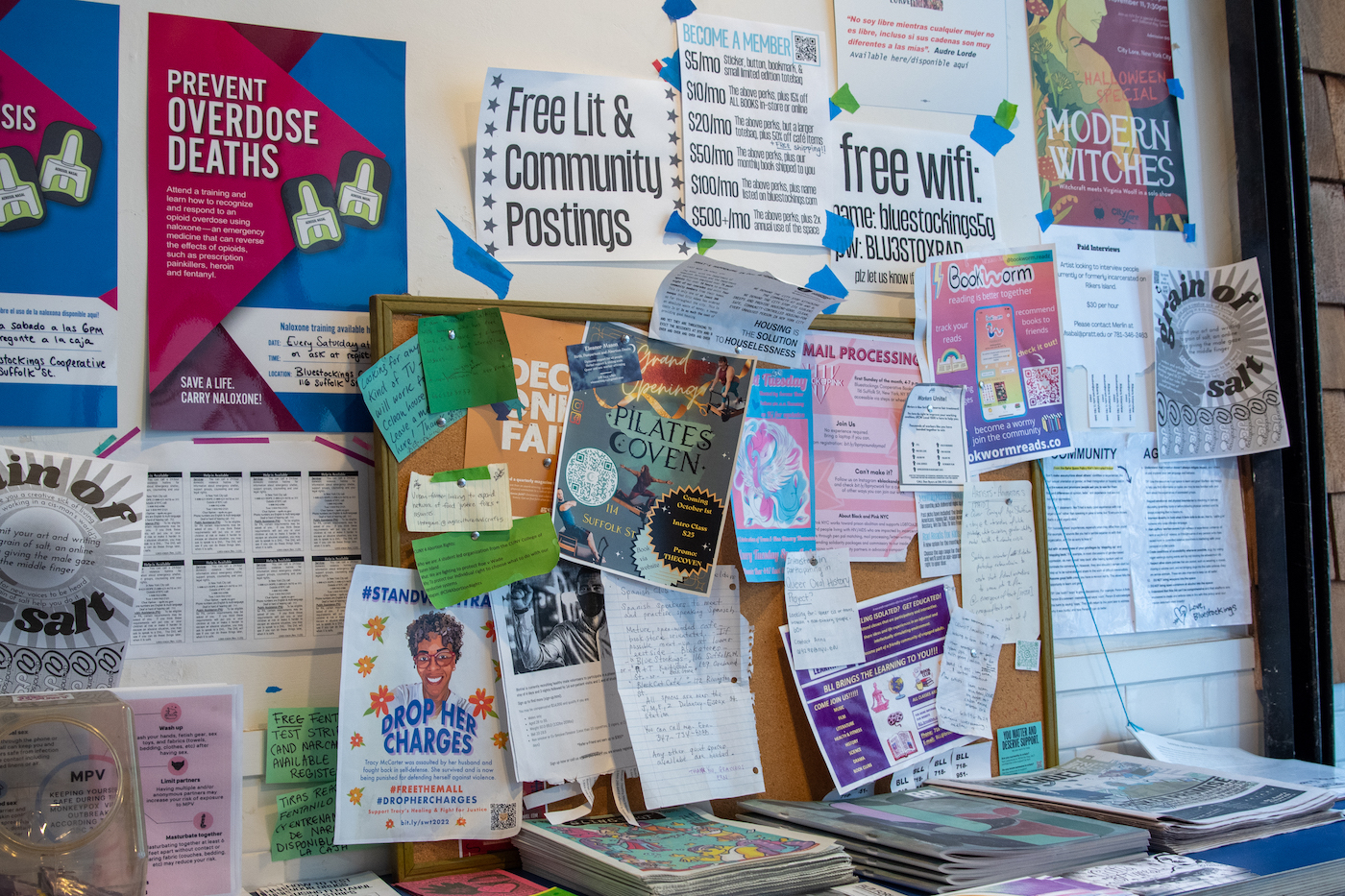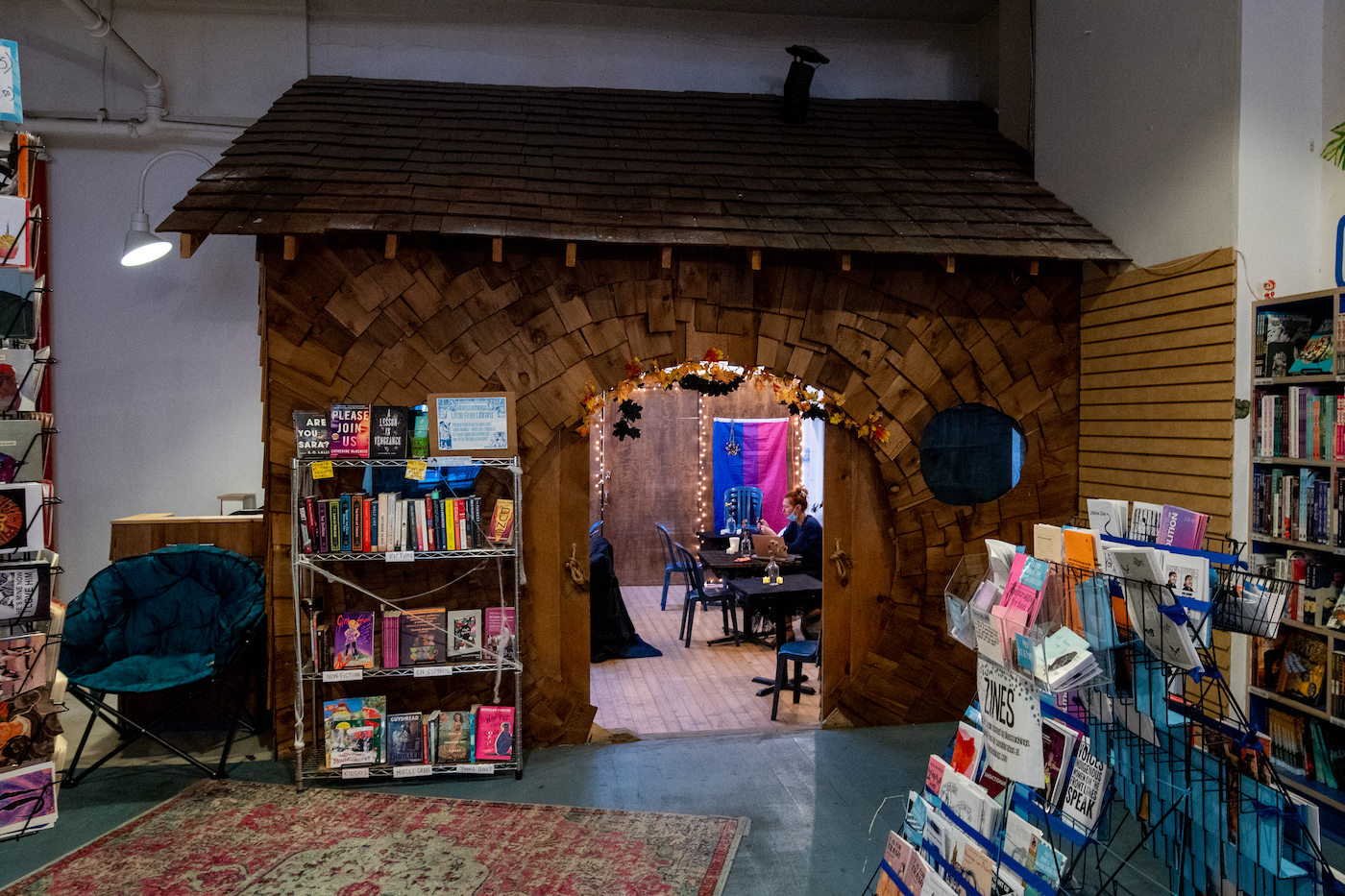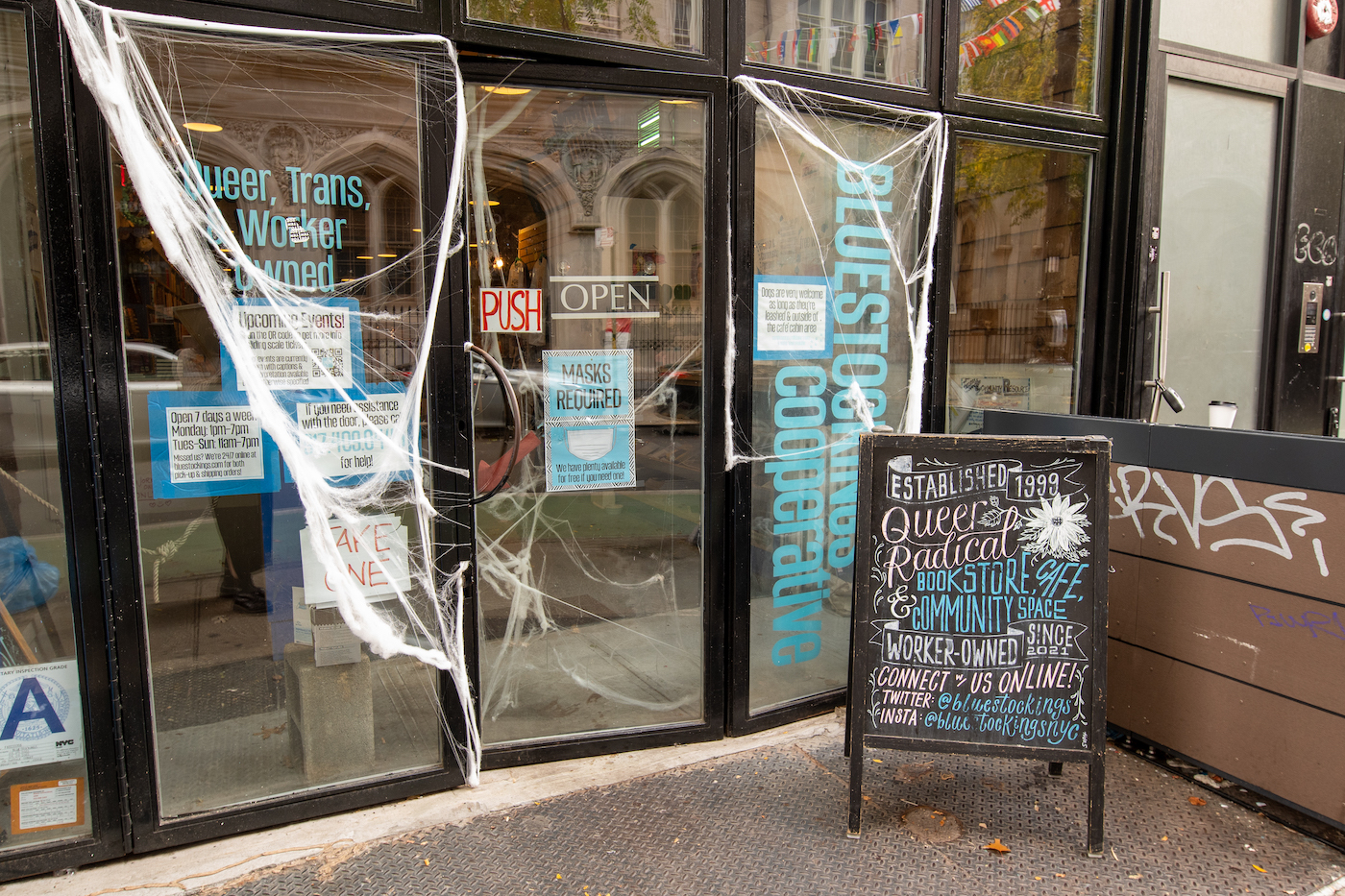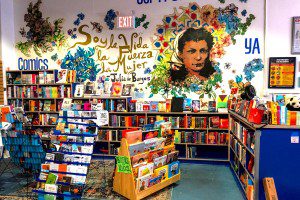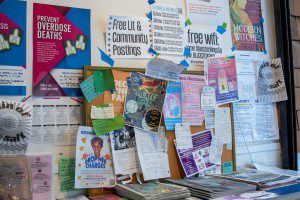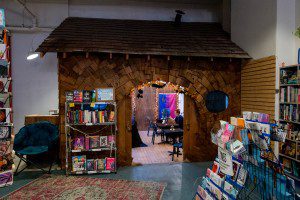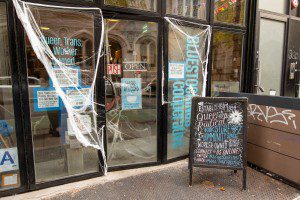Finding comfort and community at Bluestockings Cooperative Bookstore
This queer, trans, and sex worker run bookstore moonlights as a cafe, free store and activist space.
November 7, 2022
When I walked into Bluestockings Cooperative Bookstore, a radical bookstore in the Lower East Side, a couple Saturdays ago, I didn’t expect to leave with two pairs of trousers and a blazer. After wandering around the store and making my way to the back, I discovered a room covered in clothes and a poster on the wall that read “free thrift for trans people and sex workers.” Having never heard of a free thrift, I had my doubts on taking free clothes, but after confirming with an employee — who remarked that there were more bags of clothes to come — I exited the room a couple hours later with the professional attire I’d been on the hunt for at no cost.
Bluestockings Cooperative, founded in 1999, started as a volunteer-run women’s bookstore. It now exists as a worker-owned radical activist space that sells books almost exclusively written by LGBTQ+ people. The cooperative aims to serve as a resource for anyone in need, offering a free store with food, clothes and hygiene products. They also host monthly meetings over Zoom for book clubs and trans support groups.
Annalisa Myer, a trans PhD student at City University of New York’s Graduate Center, believes Bluestockings accomplishes this mission. After hearing about the free thrift on Instagram, she ventured to Suffolk Street and went home with a sweater vest, moccasins and hoodies.
“Looking for new clothes can be an expensive ordeal — even thrifting — and cost is really prohibitive for a lot of trans people, especially in the winter months when you need thicker or warmer clothes,” she said.
The store offered this free giveaway for two days in October, affirming its commitment to providing a comfortable space for the LGBTQ+ community to shop and socialize.
“The free thrift advertised size inclusivity and they provided a selection of bigger sizes,” Myer said. “I love meeting other trans people and finding community. They had a lot of high quality clothes and overall, I think the event was a big success!”
The store also features a unique program where customers pay in advance for future shoppers who may need financial support or simply a pick-me-up. Sticky notes with money amounts and profiles of people scribbled on them hang from a wall for anyone who fits the description to take one and use it as cash substitution in Bluestockings.
“$5 [for] anyone who can’t take the crushing weight of capitalism,” and “$5 [for a] queer survivor on the healing journey,” are just a few I saw.
“Bluestockings was the first place I ever saw myself reflected back to me when I was a young queer person, and that was really important,” Merlin Sabal, one of the store’s owners said. “I really hope that’s a legacy we continue.”
Sabal started as a volunteer in 2018 before landing a job when Bluestockings shifted to a worker’s cooperative in 2020. That year marked several changes, as the store closed down because of the pandemic in March 2020 and fully reopened at a new location in 2021.
“It was really important to us to stay on the Lower East Side since that’s where we’d built our community,” Sabal said. “So even if we were going to be leaving the Allen Street location, it was important for us to stay here.”
In addition to the free store program offered at Bluestockings, the cooperative is also registered as an Opioid Overdose Prevention Program in New York City.
“The Lower East Side and The Village have been really really gentrified in the past 40 years and so part of the Opioid Overdose Prevention Program and free store are our attempts at resisting some of that gentrification,” Sabal said. “I think that it is a great place for people to be learning about harm reduction because a big part of our demographic is younger queer people and a lot of those people like to go to parties and use drugs, and public outreach stuff about harm reduction is not always reaching those people.”
People can become certified in administering Narcan, a drug that reverses the effects of opioids, and leave the store with a bag carrying two sprays. The store provides free fentanyl test strips, masks and rapid COVID-19 tests.
The back room, which the free thrift was hosted in, usually operates as a cozy sitting area with tables and chairs available to anyone. The cafe sells drinks that are no more than $7, and the counter in front of it holds inexpensive pins and stickers.
It’s rare to find a reasonably-priced store in New York City. Raquel Espasande, another one of the store’s owners, witnessed customer’s surprise at this financially accessible approach.
“Sometimes it’s so sad to see how beaten down New Yorkers are because they’ll come in and say, ‘I’m so sorry, but can I please use your bathroom? I’ll buy something.’ I’m like honey, no, please use it,” Espasande said. “We have free pads in there and condoms and all sorts of stuff. It’s very sad but I’m glad we can be that space for people. There’s not a lot of places that you can exist for free in New York, especially indoors, other than libraries.”
Espasande insists that the owners never expect people to buy anything. At Bluestockings Cooperative, they want to change the idea that taking up space requires money while removing the discomfort or pressure people feel to always pay while they’re outside.
“We want you here, so don’t worry about it,” they said.
Whether you’re going in to buy a book, sip on a coffee, or just engage in the community space, Bluestockings Cooperative aspires to help out any and all New Yorkers.
Contact Sunny Sequeira at [email protected].


























































































































































